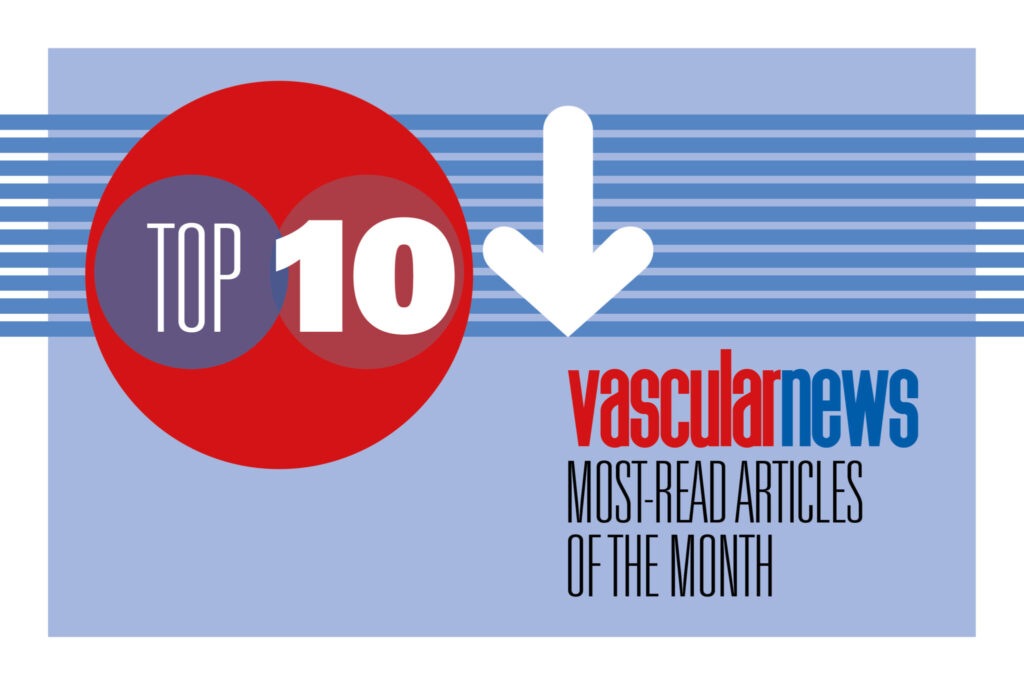 Late-breaking data shared at VIVA 2024 (3–6 November, Las Vegas, USA), the first-in-human implantation of a new bridging stent, and an interview with Ramon Varcoe (Sydney, Australia) all feature in November’s top 10.
Late-breaking data shared at VIVA 2024 (3–6 November, Las Vegas, USA), the first-in-human implantation of a new bridging stent, and an interview with Ramon Varcoe (Sydney, Australia) all feature in November’s top 10.
1. Educational supplement: Is it time to rethink your treatment strategy in calcified iliac arteries?
In the latest Vascular News educational supplement, sponsored by Shockwave Medical, experts discuss the role of the new Shockwave L6 catheter in the treatment of calcified iliac arteries.
2. Bentley announces first-in-human implantation of BeFlared bridging stent
Bentley has announced the successful first-in-human implanation of its recently CE-certified BeFlared stent graft system, which the company states is the world’s first dedicated bridging stent for fenestrated endovascular aneurysm repair (FEVAR).
3. Profile: Ramon Varcoe
Following his presentation last year of 12-month results from the “landmark” LIFE-BTK randomised controlled trial, Ramon Varcoe (Sydney, Australia) spoke to Vascular News about this research as part of his wider career in vascular surgery so far. The vascular surgeon at Prince of Wales Hospital and full professor at the University of New South Wales also considered some of the biggest challenges currently facing the specialty, detailed his hobbies and interests outside of medicine, and reflected on how past experience in professional athletics has influenced his current work.
4. Do we need to stent every calcified iliac lesion?
Mark Portou (Royal Free Hospital, London, UK) presents the case of a patient with chronic limb-threatening ischaemia (CLTI) in whom use of the new Shockwave L6 resulted in avoiding the need for a stent, thereby reducing risk to the patient and preserving future access options. This article forms part of an educational supplement sponsored by Shockwave Medical.
5. Research indicates vaping causes immediate effects on vascular function
Researchers have identified acute effects of cigarette and e-cigarette smoking on vascular function, even without nicotine. The results of the ongoing research were presented at the annual meeting of the Radiological Society of North America (RSNA 2024; 1–5 December, Chicago, USA).
6. Two-year LIFE-BTK data show sustained benefits of drug-eluting resorbable scaffold for below-the-knee arteries
Results from the second year of the LIFE-BTK clinical trial demonstrate the long-term effectiveness of the US Food and Drug Administration (FDA)-approved Esprit BTK everolimus-eluting resorbable scaffold system (Abbott Vascular) in patients with the most severe form of below-the-knee (BTK) peripheral arterial disease (PAD). The data show that the Esprit BTK offers sustained benefits over balloon angioplasty with fewer repeat procedures at two years.
7. Uncomplicated TBAD: We need everyone in the centre for once
In this Point of View piece, Firas Mussa (Houston, USA) urges specialists to put biases aside when it comes to treatment options for uncomplicated type B aortic dissection (TBAD).
8. CMS grants transitional pass-through payment for Medtronic’s Symplicity Spyral and Recor’s Paradise renal denervation systems
The Centers for Medicare and Medicaid Services (CMS) has granted transitional pass-through (TPT) payment for Medtronic’s Symplicity Spyral renal denervation (RDN) catheter and Recor Medical’s Paradise ultrasound RDN (uRDN) system, according to press releases from the two companies.
9. Humacyte clinical results published in JAMA Surgery
Humacyte recently announced the publication of clinical results evaluating the efficacy and safety of the acellular tissue engineered vessel (ATEV) in the repair of extremity civilian and military injuries in JAMA Surgery, an American Medical Association peer-reviewed journal.
10. Endologix announces 36-month results of DETOUR2 study
Endologix has announced the final 36-month results from the DETOUR2 study—a prospective, single-arm, international, multicentre clinical evaluation of the novel Detour system for fully percutaneous femoropopliteal bypass procedures.












